Banking sector suffers difficulties in 2022
At a conference on December 28 to deploy tasks of the banking sector in 2023, Nguyen Thi Hong, governor of the State Bank of Vietnam (SBV), said that the industry had experienced many difficulties due to complicated and unpredictable fluctuations in the global and domestic economy.
The global economy has witnessed rising inflation, rising oil and material prices, and tightened monetary policy of the Fed and many other central banks, which led to raising interest rates and pushing up the US dollar worldwide.
Production and business in Vietnam have entered a post-pandemic recovery period, but many challenges remain. The stock market, real estate, and corporate bonds have faced difficulties, and investor confidence has fallen, which has put great pressure on monetary policy.
The conference highlighted many issues. Firstly, how to manage credit policies to support economic growth in line with ensuring the banking system's safety. Some monetary indicators, such as credit-to-mobilised capital and credit-to-GDP ratios, are still at a concerning level.
Secondly, how to stabilise the foreign exchange market in the context of Vietnam’s economy. Domestic production depends significantly on imports, and the US dollar has appreciated strongly. Vietnam also faces the risk of being monitored strictly for currency manipulation by the US.
Thirdly, how to stabilise the money market and system liquidity amid declining market confidence amid the Saigon Bank (SCB) issue, which caused people to withdraw money from this bank ahead of the maturity dates.
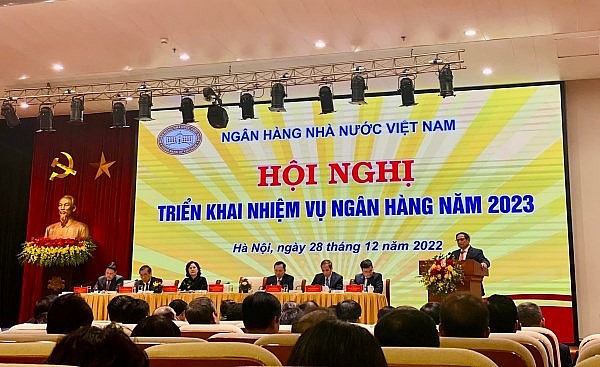 |
| Many leading bankers attended the conference |
Hong emphasised that the banking sector had contributed significantly to strengthening the macroeconomic foundation, such as controlling inflation at a low level of 3.2 per cent on average and economic growth recovering at a high rate of about 8 per cent.
The money and foreign exchange markets are stable. As of December 27, the VND depreciated by about 3.8 per cent, and the interest rate increased by nearly 1 per cent ON year. These changes are lower than in other countries in the region and the world.
In November, the US Treasury Department removed Vietnam from the monitoring list for currency manipulation in its bi-annual report to congress on macroeconomic and foreign-exchange policies of major US. trading partners.
"The results in 2022 demonstrate that flexible responses based on closely following monitoring, with each tool and solution considering the appropriate time and intensity, has contributed to solving these difficult problems," Hong said.
At the conference, the experts and participants focused on discussing key issues such as managing monetary and credit policy in line with the goal of inflation control and macroeconomic stability, effectively implementing the government's Socio-Economic Recovery and Development Programme.
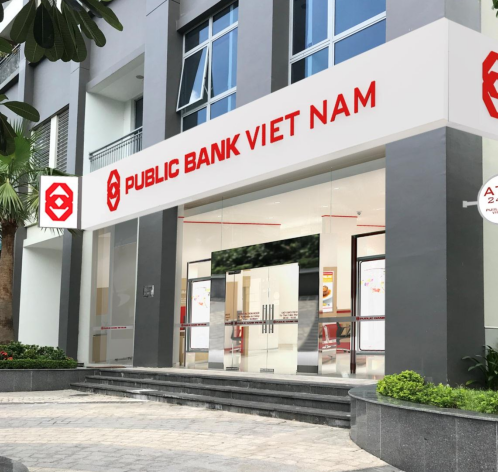 | Malaysia’s Public Bank Vietnam opens new branch in Ho Chi Minh City The State Bank of Vietnam (SBV) has just issued Document No.8930/NHNN-TTGSNH dated December 20, approving Public Vietnam Bank's eligibility to operate another branch in the country. |
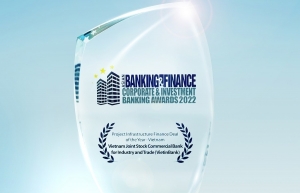 | VietinBank honoured with ‘Project Infrastructure Finance Deal of the Year’ award With the surge of foreign capital inflow and rapid expansion of the economy during recent years, VietinBank stands out as a pioneering bank financing major projects focused on enhancing existing infrastructure in Vietnam, fostering economic growth and sustainable development. |
 | TPBank to raise cash from international investors Hanoi-based TPBank is in talks with some international investors in an effort to raise funds for its expansion in 2023. |
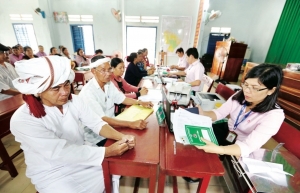 | VBSP: 20 years on the journey of poverty reduction Over the 20 years of its establishment and development, Vietnam Bank for Social Policies (VBSP) has promoted its role as an economic leverage tool for the government to help the poor and other policy beneficiaries gain access to policy credit to develop production, create jobs, raise incomes, and improve living conditions. |
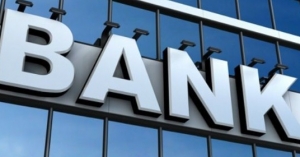 | High-risk sectors to face strict credit restrictions The State Bank of Vietnam is requiring credit institutions and foreign bank branches to execute credit and interest rate policies properly, as per a new document. |
What the stars mean:
★ Poor ★ ★ Promising ★★★ Good ★★★★ Very good ★★★★★ Exceptional
 Tag:
Tag:
Related Contents
Latest News
More News
- Banking sector targets double-digit growth (February 23, 2026 | 09:00)
- Private capital funds as cornerstone of IFC plans (February 20, 2026 | 14:38)
- Priorities for building credibility and momentum within Vietnamese IFCs (February 20, 2026 | 14:29)
- How Hong Kong can bridge critical financial centre gaps (February 20, 2026 | 14:22)
- All global experiences useful for Vietnam’s international financial hub (February 20, 2026 | 14:16)
- Raised ties reaffirm strategic trust (February 20, 2026 | 14:06)
- Sustained growth can translate into income gains (February 19, 2026 | 18:55)
- The vision to maintain a stable monetary policy (February 19, 2026 | 08:50)
- Banking sector faces data governance hurdles in AI transition (February 19, 2026 | 08:00)
- AI leading to shift in banking roles (February 18, 2026 | 19:54)






















 Mobile Version
Mobile Version